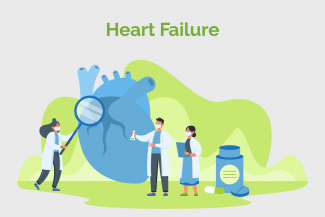Heart Failure is a commonly seen condition amongst our aging population. In spite of advanced therapeutic science, incidence rates continue to increase. Life expectancy of patients with Heart Failure can be improved with lifestyle changes and compliance with their treatment plan. Mumbai-based cardiologist, Dr Nihar Mehta explains Heart Failure comprehensively.

Heart failure can be avoided by working on lifestyle changes and decreasing your risk factors if any:
- Regular exercise is a must. 5 days or 150 hours of cardiovascular exercises per week is the recommended goal to stay physically active.
- Maintain optimal body weight. If you are overweight or obese, lose the excess pounds.
- Eat healthy foods such as vegetables, fruits, lean meats, fish etc. Avoid processed, packaged and preserved foods.
- Stop smoking and use of other tobacco products to reduce your chances of damaging your blood vessels.
- Reduce alcohol intake to 1 drink per day. Avoid binges or heavy drinking.
- Avoid substance abuse especially products like cocaine, opioids and amphetamines.
- Manage your blood pressure if you have hypertension. Check it regularly and take prescribed medications. Avoid excess salt in your diet.
- Control your diabetes by monitoring your blood glucose levels regularly, avoiding sugar and carbohydrate rich foods and taking your medicines on time.
- Maintain your cholesterol levels to avoid clogging your arteries. Eat good fats and keep your LDL levels in control.
- Get regular heart screening done if you have a family history of heart diseases or are undergoing chemotherapy.
References:
- https://www.nhs.uk/conditions/electrocardiogram
- https://www.heart.org/en/health-topics/heart-failure/diagnosing-heart-f…
- https://www.uptodate.com/contents/heart-failure-beyond-the-basics
- https://www.ncbi.nlm.nih.gov/pmc/articles/PMC4765013/
- https://pubmed.ncbi.nlm.nih.gov/36642484
- https://my.clevelandclinic.org/health/diagnostics/22629-b-type-natriure…
- https://www.nhs.uk/conditions/heart-failure/treatment/
Changed
16/Mar/2025
Community
Condition
















